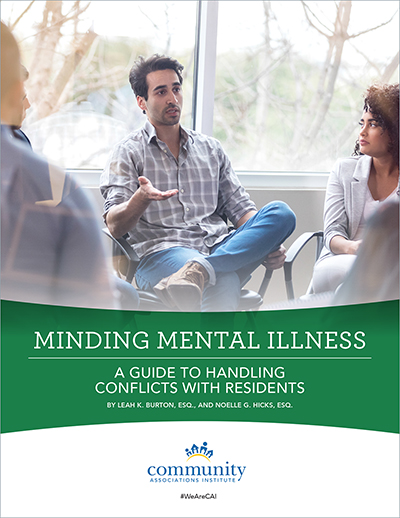Contributed by Leah K. Burton, Esq., and Noelle G. Hicks, Esq.
At first blush, it may seem harmless—and not a community association’s responsibility—when a resident suffers from a mental illness, but there occasionally can be dangerous situations. Board members and community managers need to have a plan in place.
Community associations are designed to maintain common areas, preserve and protect property values, provide services for members, and develop a sense of community. Mental health issues could affect each of those responsibilities.
An association has an obligation to uniformly enforce its governing documents and to act in good faith and in what the board reasonably believes to be in the best interest of the community. Deed restriction enforcement, Fair Housing Act violations, and potential liability for negligence can be at play when dealing with a resident who has a mental illness.
While it is not the community association’s duty or obligation (nor would it be appropriate) to try to determine if a resident has a mental disability, it is the association’s responsibility to preserve peace. Oftentimes, traditional deed restriction enforcement activities just aren’t effective at obtaining compliance from a mentally unstable resident.
Mental illnesses are some of the most common health conditions in the United States. One in five people live with a mental health condition of some kind. One in 25 people live with a serious mental illness such as schizophrenia, bipolar disorder, or major depression. Over 50% of us will be diagnosed with a mental illness or disorder at some point in our lives.
Community associations should lead with compassion and empathy while at the same time taking steps to comply with the association’s enforcement provisions.
It’s hard not to get emotionally involved in a troubled resident’s mental health struggles, but board members and managers must remember the purposes for which the community association model exists and the related obligations. They should educate themselves regarding the legal issues at play and understand best practices that can and should be utilized to address mental health issues in communities.
Board members and managers can confront mental health or illness in their communities by honoring the association’s obligations to the community and its membership while avoiding liability.
Leah K. Burton is an attorney with Steptoe & Johnson in Plano, Texas, and Noelle G. Hicks is an attorney with Roberts Markel Weinberg Butler Hailey in San Antonio. Hicks serves on the Community Association Managers International Certification Board of Commissioners and is a member of CAI’s 2023 Business Partners Council.
>>Examine the issues and explore possible solutions in CAI’s Minding Mental Illness guide.



